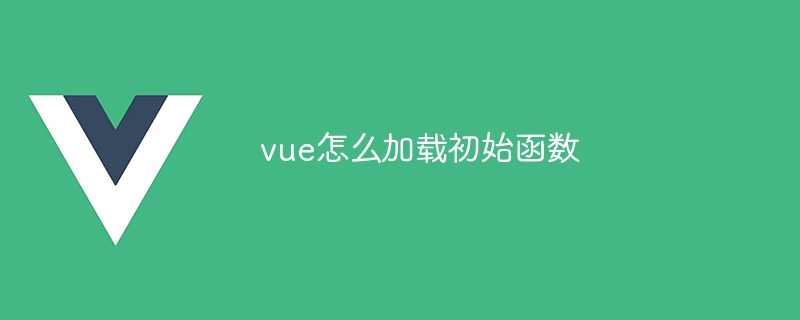How to load initial function for vue
The main methods for loading initial functions in Vue are: mounted option: triggered when the component is mounted to the DOM. beforeCreate hook: Before mounted hook, fired before creating component instance. Data factory function: Executes when creating a component instance, returning the component's data object. Global Mix: Defines common behavior that can be used in all components.

How to load initial function in Vue
Loading initial functions in Vue applications is important for initializing the component before it is rendered. There are several ways to do this.
1. Mounting options
The mounted() option is the most direct method in Vue and is triggered when the component is mounted to the DOM. Using this option, you can write a function that contains the initial function, as shown below:
<code class="javascript">export default { mounted() { // 执行初始函数this.initFunction(); }, methods: { initFunction() { // 初始函数的内容} } }</code>2. beforeCreate hook
The beforeCreate hook is fired before the component instance is created, predately than the mounted hook. With this hook, the initial function can be called during component creation.
<code class="javascript">export default { beforeCreate() { // 执行初始函数this.initFunction(); }, methods: { initFunction() { // 初始函数的内容} } }</code>3. Data factory functions
Data factory functions are another way to execute initial functions when creating component instances. This function returns the component's data object where the initial function can be called.
<code class="javascript">export default { data() { return { // 执行初始函数initFunction() { // 初始函数的内容} } } }</code>4. Global mixing
Global mixing allows common behavior to be defined in all components. Global mixing can be used to define a method that contains the initial function.
<code class="javascript">// 全局混入const globalMixin = { methods: { initFunction() { // 初始函数的内容} } }; // 在main.js 中注册全局混入Vue.mixin(globalMixin);</code>Choose the right method
Choosing the most appropriate method depends on the specific needs. For simple initialization, the mounted option or the beforeCreate hook is sufficient. Data factory functions are a better choice if you need to execute the initial function when creating a data object. For general behavior, global mixing is very useful.
The above is the detailed content of How to load initial function for vue. For more information, please follow other related articles on the PHP Chinese website!

Hot AI Tools

Undresser.AI Undress
AI-powered app for creating realistic nude photos

AI Clothes Remover
Online AI tool for removing clothes from photos.

Undress AI Tool
Undress images for free

Clothoff.io
AI clothes remover

Video Face Swap
Swap faces in any video effortlessly with our completely free AI face swap tool!

Hot Article

Hot Tools

Notepad++7.3.1
Easy-to-use and free code editor

SublimeText3 Chinese version
Chinese version, very easy to use

Zend Studio 13.0.1
Powerful PHP integrated development environment

Dreamweaver CS6
Visual web development tools

SublimeText3 Mac version
God-level code editing software (SublimeText3)

Hot Topics
 1662
1662
 14
14
 1419
1419
 52
52
 1311
1311
 25
25
 1262
1262
 29
29
 1235
1235
 24
24
 How to use bootstrap in vue
Apr 07, 2025 pm 11:33 PM
How to use bootstrap in vue
Apr 07, 2025 pm 11:33 PM
Using Bootstrap in Vue.js is divided into five steps: Install Bootstrap. Import Bootstrap in main.js. Use the Bootstrap component directly in the template. Optional: Custom style. Optional: Use plug-ins.
 How to add functions to buttons for vue
Apr 08, 2025 am 08:51 AM
How to add functions to buttons for vue
Apr 08, 2025 am 08:51 AM
You can add a function to the Vue button by binding the button in the HTML template to a method. Define the method and write function logic in the Vue instance.
 How to use watch in vue
Apr 07, 2025 pm 11:36 PM
How to use watch in vue
Apr 07, 2025 pm 11:36 PM
The watch option in Vue.js allows developers to listen for changes in specific data. When the data changes, watch triggers a callback function to perform update views or other tasks. Its configuration options include immediate, which specifies whether to execute a callback immediately, and deep, which specifies whether to recursively listen to changes to objects or arrays.
 What does vue multi-page development mean?
Apr 07, 2025 pm 11:57 PM
What does vue multi-page development mean?
Apr 07, 2025 pm 11:57 PM
Vue multi-page development is a way to build applications using the Vue.js framework, where the application is divided into separate pages: Code Maintenance: Splitting the application into multiple pages can make the code easier to manage and maintain. Modularity: Each page can be used as a separate module for easy reuse and replacement. Simple routing: Navigation between pages can be managed through simple routing configuration. SEO Optimization: Each page has its own URL, which helps SEO.
 How to return to previous page by vue
Apr 07, 2025 pm 11:30 PM
How to return to previous page by vue
Apr 07, 2025 pm 11:30 PM
Vue.js has four methods to return to the previous page: $router.go(-1)$router.back() uses <router-link to="/" component window.history.back(), and the method selection depends on the scene.
 React vs. Vue: Which Framework Does Netflix Use?
Apr 14, 2025 am 12:19 AM
React vs. Vue: Which Framework Does Netflix Use?
Apr 14, 2025 am 12:19 AM
Netflixusesacustomframeworkcalled"Gibbon"builtonReact,notReactorVuedirectly.1)TeamExperience:Choosebasedonfamiliarity.2)ProjectComplexity:Vueforsimplerprojects,Reactforcomplexones.3)CustomizationNeeds:Reactoffersmoreflexibility.4)Ecosystema
 How to use vue traversal
Apr 07, 2025 pm 11:48 PM
How to use vue traversal
Apr 07, 2025 pm 11:48 PM
There are three common methods for Vue.js to traverse arrays and objects: the v-for directive is used to traverse each element and render templates; the v-bind directive can be used with v-for to dynamically set attribute values for each element; and the .map method can convert array elements into new arrays.
 How to jump to the div of vue
Apr 08, 2025 am 09:18 AM
How to jump to the div of vue
Apr 08, 2025 am 09:18 AM
There are two ways to jump div elements in Vue: use Vue Router and add router-link component. Add the @click event listener and call this.$router.push() method to jump.




